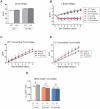Butyrate and propionate protect against diet-induced obesity and regulate gut hormones via free fatty acid receptor 3-independent mechanisms
- PMID: 22506074
- PMCID: PMC3323649
- DOI: 10.1371/journal.pone.0035240
Butyrate and propionate protect against diet-induced obesity and regulate gut hormones via free fatty acid receptor 3-independent mechanisms
Abstract
Short-chain fatty acids (SCFAs), primarily acetate, propionate, and butyrate, are metabolites formed by gut microbiota from complex dietary carbohydrates. Butyrate and acetate were reported to protect against diet-induced obesity without causing hypophagia, while propionate was shown to reduce food intake. However, the underlying mechanisms for these effects are unclear. It was suggested that SCFAs may regulate gut hormones via their endogenous receptors Free fatty acid receptors 2 (FFAR2) and 3 (FFAR3), but direct evidence is lacking. We examined the effects of SCFA administration in mice, and show that butyrate, propionate, and acetate all protected against diet-induced obesity and insulin resistance. Butyrate and propionate, but not acetate, induce gut hormones and reduce food intake. As FFAR3 is the common receptor activated by butyrate and propionate, we examined these effects in FFAR3-deficient mice. The effects of butyrate and propionate on body weight and food intake are independent of FFAR3. In addition, FFAR3 plays a minor role in butyrate stimulation of Glucagon-like peptide-1, and is not required for butyrate- and propionate-dependent induction of Glucose-dependent insulinotropic peptide. Finally, FFAR3-deficient mice show normal body weight and glucose homeostasis. Stimulation of gut hormones and food intake inhibition by butyrate and propionate may represent a novel mechanism by which gut microbiota regulates host metabolism. These effects are largely intact in FFAR3-deficient mice, indicating additional mediators are required for these beneficial effects.
Conflict of interest statement
Figures






References
-
- Bergman EN. Energy contributions of volatile fatty acids from the gastrointestinal tract in various species. Physiol Rev. 1990;70:567–590. - PubMed
-
- Brown AJ, Goldsworthy SM, Barnes AA, Eilert MM, Tcheang L, et al. The Orphan G protein-coupled receptors GPR41 and GPR43 are activated by propionate and other short chain carboxylic acids. J Biol Chem. 2003;278:11312–11319. - PubMed
-
- Le Poul E, Loison C, Struyf S, Springael JY, Lannoy V, et al. Functional characterization of human receptors for short chain fatty acids and their role in polymorphonuclear cell activation. J Biol Chem. 2003;278:25481–25489. - PubMed
MeSH terms
Substances
LinkOut - more resources
Full Text Sources
Other Literature Sources
Medical
Molecular Biology Databases
Research Materials

